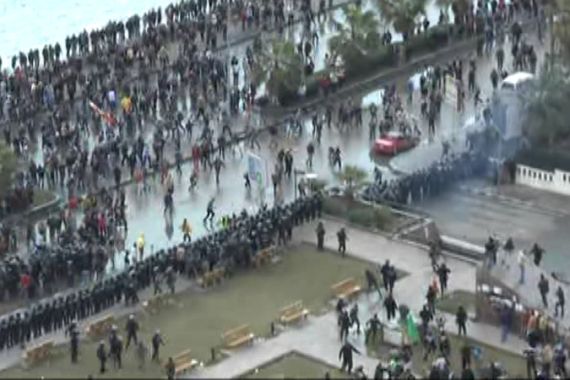Rivals clash ahead of Egypt constitution vote
Rival protesters fight on streets of Alexandria over controversial draft constitution to be put to vote on Saturday.

Clashes have broken out in northern Egypt between supporters of the Muslim Brotherhood and opponents of the country’s highly contentious draft constitution.
The two sides hurled rocks and stones at each other on Friday in the Mediterranean port city of Alexandria, prompting police to fire tear gas to separate them.
Buses and several cars were set on fire. The buses reportedly belong to the Muslim Brotherhood, although it is not clear who set them alight.
Egypt’s ministry of health said at least 77 people were hurt, as lines of black-clad officers kept apart of the supporters of the President Mohamed Morsi on one side and the anti-constitution protesters on the other.
|
“In reality Egypt is now on the verge of building a new political system that will be open to all political forces“ – Essam El-Erian, Deputy head of Freedom and Justice Party |
The proposed new constitution has deeply divided Egypt, with supporters of Egypt’s elected president backing the new documents, and mainly liberal opponents decrying it as partisan and lacking in important rights protections for minorities and women.
In order to pass, the proposed constitution must be approved by more than 50 percent of those voting.
The clashes add to the already tense political crisis in Egypt on the eve of the second leg of voting on the draft charter.
Security forces cordoned off streets leading to the Qaed Ibrahim mosque in the heart of the city on the Mediterranean coast, where thousands of Salafi Islamists staged a demonstration they called “the million-man rally to defend clerics and mosques”.
The rally came in response to last week’s violence, when well-known ultraconservative Salafi preacher Sheik Ahmed el -Mahalawi was trapped inside the mosque while his supporters battled opponents outside with swords and firebombs.
El-Mahalawi stirred anger with a sermon last Friday, when he denounced opponents of the Muslim Brotherhood-friendly constitution as “followers of heretics”.
Second phase of referendum
The voting for the second phase of the referendum on the draft constitution is take place on Saturday.
On Friday, the Egyptian army began taking control of polling stations ahead of the final stage of vote.
Army trucks fanned out this morning in Giza, one of the provinces taking part in tomorrow’s ballot, with soldiers arriving to spend the night in schools that double as polling stations.
The head of the Aziz al-Masry school in Giza, which will serve as polling station on Saturday, told the Reuters news agency that they had made all necessary preparations for the ballot.
“Everything has gone according to plan. And this is of course under the instruction of the authorities, and we are prepared for everything,” he said.
Morsi and his backers say the new constitution is needed to seal a transition from decades of military-backed autocratic rule, while opponents say it ignores the rights of women and minorities, including the 10 percent of Egyptians who are Christian.
But a leading Muslim Brotherhood official dismissed concerns that the new constitution will lead to greater division or upset Egypt’s fragile political balance.
“Egypt is not divided and is not facing any internal dangers,” said Essam El-Erian, the deputy head of the Brotherhood-affiliated Freedom and Justice Party.
“In reality Egypt is now on the verge of building a new political system that will be open to all political forces,” he said.
Demonstrations erupted when Morsi awarded himself sweeping powers on November 22, and then fast-tracked the constitution through a drafting assembly dominated by his Islamist allies and boycotted by many liberals.
Human Rights advocates have sharply criticised the first round of voting on December 15, saying that the lack of comprehensive judicial supervision opened the process to abuse.